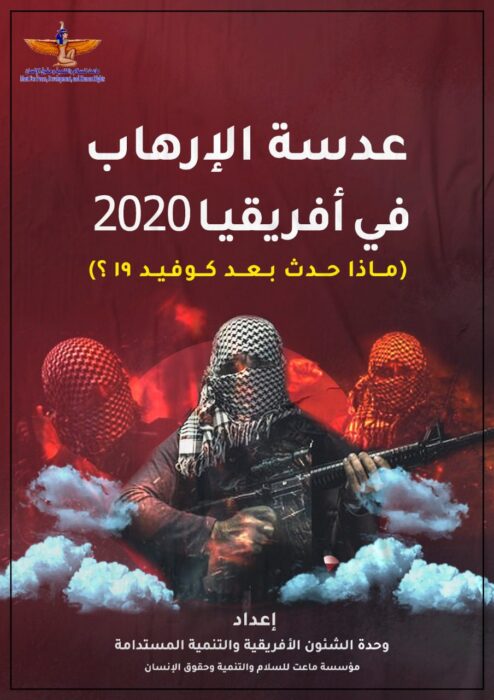“Aqeel”: We must learn from the lessons of the past and confront extremist attempts seeking footholds in Africa.
Pasha: East African governments should activate ethnic conflict resolution mechanisms
Basant Essam: We recommend the formation of a special counter-terrorism unit that will operate under the umbrella of the African Peace and Security Council
Maat Foundation for Peace, Development and Human Rights issued its first annual report entitled: “The lens of terrorist operations in Africa .. What happened after Covid 19?”, Which monitors the most prominent terrorist attacks that the African countries have been exposed to during the Covid 19 pandemic, and the repercussions of the global health crisis on the situation On the continent.
In 2020, not a day passed without Africa being affected by an explosion carried out by the Mujahideen Youth Movement in the east, or newspapers reported innocent victims of a suicide attack carried out by the Nigerian Boko Haram group in the west. Even the regional and international missions were not spared from these attacks, besides A large number of tribal violence victims across the continent. All these factors have prompted the Maat Foundation for Peace to track the phenomenon of terrorism in the African continent and to monitor terrorist operations on a monthly basis, in addition to its first annual report, and to monitor ways to address them in a way that ensures the achievement of Goal 16 of the Sustainable Development Goals and the fourth aspiration of Agenda 2063 where Africa is safe and secure.
The report includes, in the first section, the most prominent terrorist operations that took place during the past year, whether those that occurred under the guise of religion or the violent incidents that were mainly formed due to tribal and separatist strife, which reached more than 525 bloody incidents, which occurred in 27 African countries As a result, at least 7,030 people were killed.
As for the second topic, it dealt with efforts to combat terrorism by international, regional and national forces in light of the entire world’s preoccupation with confronting the coronavirus.
The report also deals with an analytical view on the phenomenon of black terrorism on the continent, and a qualitative classification of the victims according to a number of indicators and figures. The analytical vision included in the report also addressed the causes of the spread of terrorism in the continent. In both its internal and external aspects, as well as presenting the human rights repercussions resulting from the concentration of terrorist outposts, which bear their burdens, in the first place; African peoples with their vulnerable and marginalized groups. The report concludes with a set of recommendations presented to African governments, the African Union, as well as civil society organizations and all stakeholders.
In this context, “Ayman Aqil,” President of the Maat Foundation for Peace, Development and Human Rights stated: The African continent is still bleeding due to the incursion of major terrorist organizations into its territories, despite the African Union adopting its slogan “Silencing the guns” for 2020. The human rights expert added, “We must learn from the lessons of the past, referring to the concentration of terrorism in the east and west of the continent since The nineties, and confront any other extremist attempts to search for a new foothold within the African continent. Akil warned of the development of terrorism in fragile African countries such as Burkina Faso and Mozambique, which may become a new "Somalia" in the near future.
For his part, “Abd al-Rahman Pasha,” Deputy Head of the African Affairs and Sustainable Development Unit at the Maat Foundation, said: That after a year and more of monitoring terrorist and extremist incidents in the African continent, we found that tribal clashes, especially in the east of the continent, are no less dangerous than terrorist operations that operate under the guise of religion. He went on to call upon the governments of East Africa, led by Ethiopia, Sudan and South Sudan, to find a solution to the ethnic fighting that claims hundreds of lives, and to work on activating mechanisms for resolving conflict between different tribes and ethnicities.
On a related note, Basant Essam El-Din, a researcher at the Foundation's African Affairs and Sustainable Development Unit, said: African countries lack the speed to respond to global and regional developments, especially after the Covid-19 pandemic, which in one way or another has contributed to the spread of terrorism on the continent. For her part, the researcher called on African governments to reconsider the formation of a special counter-terrorism unit operating under the umbrella of the African Rapid Intervention Force, as well as the need to activate a working group that includes all parties concerned with combating terrorism, including the Military Staff Committee of the Peace and Security Council, regional bodies and UN cooperation agencies.
Notably, Africa is among the issues of concern to Maat for Peace, Development and Human rights, being a member of the General Assembly for the Economic, Social & Cultural Council (ECOSOCC) of the Africa Union (AU). Moreover, Maat serves as an Observer in The African Commission on Human and People’s Rights (ACHPR) and as a Northern African Coordinator in the major Non-Governmental Organizations (NGOs) in Africa of the United Nations Department of Economic and Social Affairs (UN DESA).
To view the full report through the following link
shortlink: https://maatpeace.org/en/?p=32596












